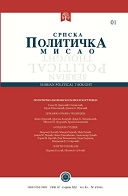КОРУПЦИЈА И ЕКОНОМСКИ РАЗВОЈ
CORRUPTION AND ECONOMIC DEVELOPMENT
Author(s): Danilo ŠukovićSubject(s): Politics / Political Sciences
Published by: Институт за политичке студије
Keywords: Corruption; economic development; institutions; informal taxes; the middle class
Summary/Abstract: In this paper, we analyze the highly complex phenomenon of corruption in terms of its impact on economic development. This paper shows how great endemic corruption, which is present in Serbia, is especially damaging to the economy and society, destroying the institutions of the system and hindering economic growth. It is analyzing the extent of the negative impact of corruption on investment and growth, as well as the effects of corruption on the business performance of companies that carry out bribery. In particular, it is conclusively established that corruption reduces tax revenues, increases expenditures of public services and wrongly diverts resources to the private sector. It is established the negative correlation between corruption and growth. If the corruption is put under control of the official state institutions and in that way it works for the benefit of particular rather than the general interest of society, then there is a condition which the World Bank defines as “state capture”. The paper contains a review of some examples of quantifying economic effects of corruption, which indicate that corruption is an additional tax on that foreign investors are very sensitive. Increase corruption by one point on a scale of 1 to 10, means reduction in foreign direct investment by 16%. One of the questions that this paper deals with is the assessment of the effects of corruption on the business performance of companies that carry out bribery. In connection with this, corruption is associated with a set of political and regulatory factors such as the size of the public sector, autocratic government, low regulation and low economic competition, as well as a set of cultural variables, such as the low level of public trust, no protestant population, etc.
Journal: Српска политичка мисао
- Issue Year: 2014
- Issue No: 1
- Page Range: 43-54
- Page Count: 12

